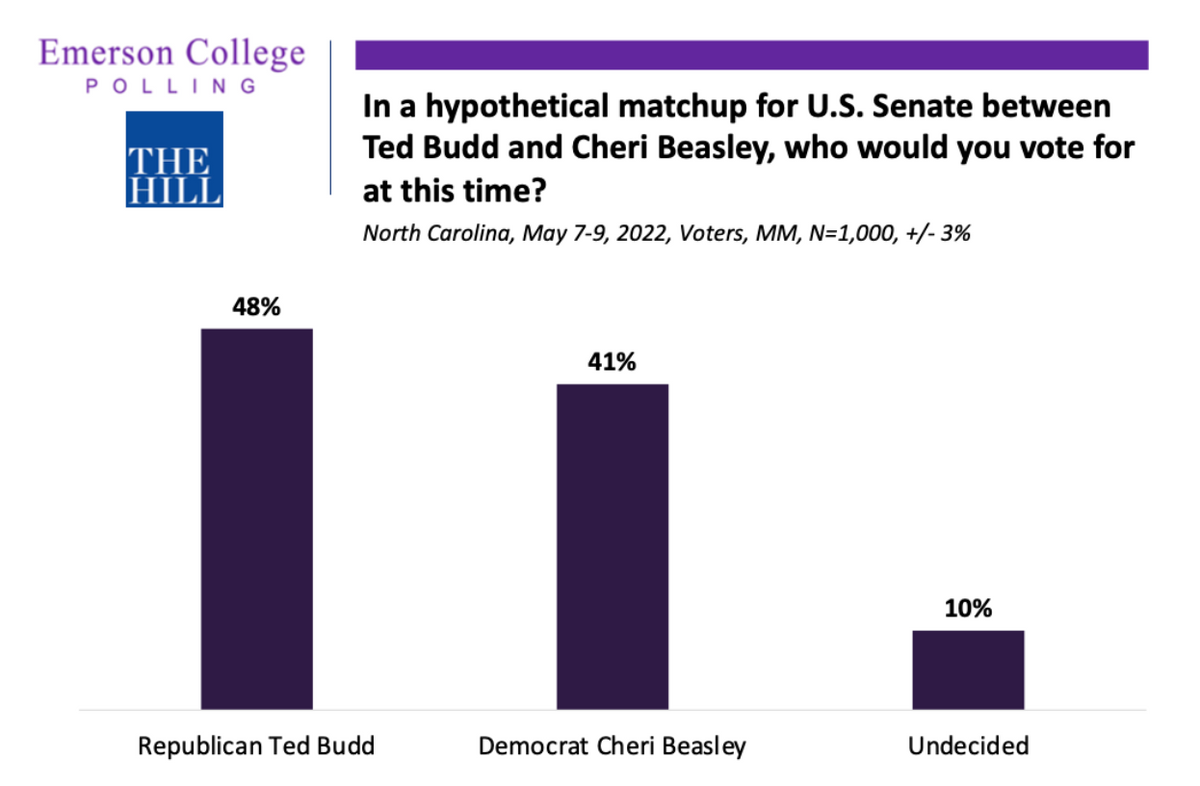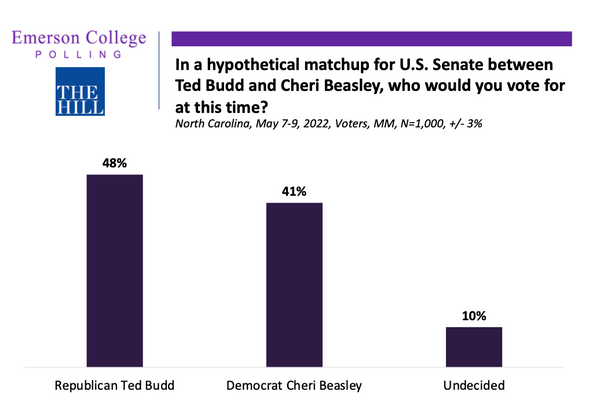An Emerson College Polling/The Hill poll in North Carolina finds Republican Ted Budd leading the Republican primary for US Senate with the plurality, 43%, of support while former Governor Pat McCrory holds 16% support. Since last month’s North Carolina Poll, Budd has gained four points of support while McCrory has lost six points.
A majority (61%) of Republican primary voters say President Trump’s endorsement of a candidate makes them more likely to vote for a candidate, while 14% say it makes them less likely, and a quarter (25%) say it makes no difference. Trump-endorsed candidate Ted Budd holds 52% support among those who say the former President’s endorsement makes them more likely to vote for a candidate, whereas Pat McCrory holds a plurality, 41%, among those who say Trump’s endorsement makes them less likely. Among voters who are undecided, 52% say a Trump endorsement makes them more likely to support a candidate, 20% are less likely, and 28% say it makes no difference.
Facing presumptive Democratic nominee Cheri Beasley in the general election, Ted Budd leads 48% to 41% with 10% undecided. This margin reflects no change since the April head to head ballot test where Budd also led by seven points. Facing Pat McCrory, Beasley leads 44% to 39% with 17% undecided.

Spencer Kimball, Executive Director of Emerson College Polling said, “There is a gender divide in the potential general election matchup between Budd and Beasley in North Carolina. A majority, 51%, of male voters support Ted Budd compared to 39% supporting Cheri Beasley, while female voters are split: 45% support Budd and 44% support Beasley.”
President Joe Biden holds a 45% approval in North Carolina, while 49% disapprove of the job he is doing as president.
A plurality (46%) of North Carolina voters think the Supreme Court should uphold Roe v. Wade, while 36% think they should overturn it, and 18% are unsure or have no opinion. If the Supreme Court does allow states to determine the legality of abortion, 51% say it makes them more likely to vote in the Midterms, whereas 6% say it makes them less likely and 43% say it makes no difference.
Among those who say they are more likely to vote in the midterm elections if the Supreme Court does allow states to determine the legality of abortion, 53% would support Democrat Cheri Beasley in a general election matchup against Republican Ted Budd. Among undecided voters in a Budd-Beasley general election, 40% think Roe v. Wade should be upheld, 36% say it should be overturned, and 35% are unsure.
Voters were split on if the North Carolina legislature should make it easier to access abortion, harder to access abortion, or not pass abortion legislation. A slim plurality, 38%, say they should make it easier to access abortion, whereas 36% say they should make it harder to access abortion. Twenty-seven percent (27%) think the legislature should not pass abortion laws.
When asked which of the following statements comes closest to their position on abortion: legal in all cases, legal up to 20 weeks of pregnancy, legal up to 6 weeks of pregnancy, legal only in cases of rape, incest, and when the woman’s life is endangered, or illegal in all cases, nearly a third (32%) say it should only be legal in certain cases, while 28% say it should be legal in all cases. Nineteen percent (19%) say it should be legal up to 20 weeks of pregnancy. Thirteen percent (13%) say it should be illegal in all cases, and 8% say it should be legal up to six weeks of pregnancy.
Caller ID
The Emerson College Polling North Carolina poll of registered voters was conducted May 7-9, 2022. The general election sample consisted of registered voters, n=1,000, with a Credibility Interval (CI) similar to a poll’s margin of error (MOE) of +/- 3 percentage points. The Republican primary sample consisted of Republican primary voters, n=467, with a Credibility Interval (CI) similar to a poll’s margin of error (MOE) of +/- 4.5 percentage points. The data sets were weighted by gender, age, education, race, and region based on 2022 turnout modeling. It is important to remember that subsets based on gender, age, ethnicity, party, and region carry with them higher margins of error, as the sample size is reduced. Data was collected using a cellphone sample of SMS-to-web, an Interactive Voice Response (IVR) system of landlines, and an online panel provided by Amazon MTurk.


